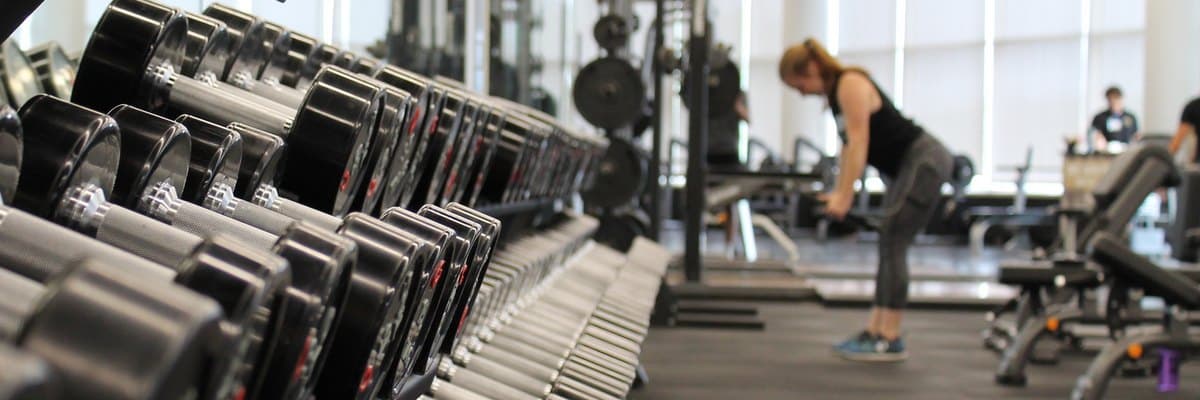Gym Insurance: Coverages, Cost, and Exclusions

Not all gyms and fitness clubs carry the same risks, but the truth is that instructors can’t provide 100% safety to their clients. For example, a yoga studio is less risky than a gym that has weights and exercise machines, but it doesn’t mean that accidents can’t happen during a regular yoga class.
Before you officially start running the gym, request a gym insurance quote from various providers, and find the policy that will offer enough coverage for all your assets. Continue reading to learn more about what gym insurance is, what it covers, and how much you can expect to pay for it annually.
What is Gym Insurance?
Gym insurance is a type of commercial coverage aimed at protecting gym owners from potential accidents and lawsuits that could occur on their premises.
The policy usually consists of different coverages that protect various aspects of the gym business. To create a custom-tailored solution for you, your insurance provider will consider your existing annual revenue, the number of clients, machines, and equipment your possess and programs and classes your gym offers.
Not all the fitness clubs have the same coverages included in their policy, and such variations depend on the type of facility that you have. For example, if you’re renting a gym space, your landlord may ask you to purchase tenant insurance.
What are Common Gym Exposures?
Gyms and fitness clubs carry a lot of risks, which is why the owners should never leave things to chance and purchase a policy that will protect them from spending money on an injured client’s medical bills, lawsuits, and property damage.
Circumstances that often put a gym at risk are:
- Trainers that work as independent contractors: If you hire a trainer who will work as an independent contractor, you should require them to have independent contractor insurance. If they don’t have it, your gym can be sued for actions where an independent trainer is at fault.
- Trip and fall accidents: Such accidents often include tripping over equipment, being bumped by someone, or falling over someone’s belongings, damaging them.
- Workout injuries: Situations where clients sprain their ankles or injure their spine are quite frequent, and they can even be a result of a trainer’s fault.
- Health issues: Your clients may get sick from contaminated equipment or experience inconveniences due to heart issues.
- False advertising: Gyms tend to promise unbelievable results their team can provide to clients, and such a thing rarely ends up well. Namely, clients can sue you for not rendering services, as you promised.
- Damaged or stolen gym equipment: Gym equipment can be quite expensive, which is why its damage or theft can cause a lot of troubles.
- Temporary or permanent gym shutdown: Your gym can be shut down due to many reasons – fire, flood, or equipment failure, for example – and such a thing can affect your revenue.

What is Covered with Insurance for Gyms?
As a gym owner, you need to be aware of the risks your facility is carrying, which is why your insurance policy needs to consist of various coverages that will protect you from exceptionally high costs due to lawsuits, property damages, or medical charges.
General Liability Insurance
Gym liability insurance is essential for keeping your business from the costs of accidental injuries, property damage, and copyright infringement claims. Also, some of the general liability policies will protect you from the damage to rented premises.
Professional Liability Insurance
Another type of liability insurance for gyms is professional liability coverage, which protects a gym owner from lawsuits due to giving wrong advice or inappropriate training program to clients.
A typical claim includes a client with heart issues who suffered a heart attack while practicing aerobics and sues an instructor or a gym. Professional liability insurance will pay for legal costs and settlements, but it won’t include trainers who work in your gym as independent contractors.
RELATED:
- 5 Small Business Policies Worth Considering in 2020
- Understand the Basics of Restaurant Insurance and Its Importance
- What are the Types of Policies Needed for a Bakery?
- Massage Therapy Insurance Explained
- Independent Contractor Insurance 101: Coverage & Requirements
- Who Needs Product Liability Insurance?
- The Essence of Flood Insurance
- Ultimate Guide to Hotel & Motel Coverage
- Critical Facts about Workers’ Comp Insurance
Building Property Insurance
Building property insurance for gyms covers the premises you rented to run your gym business, and it also protects the landlord’s building. In most cases, landlords are those that ask for this type of policy.
One of the most common claims covered with building property insurance is a burst pipe, which floods the unit. Thanks to this policy, the total cost of repair will be reimbursed.
Apart from the facility, this coverage will protect the gym’s contents such as mats, weighs, scale, office administrative systems, and machines.
Workers’ Comp Insurance
If you have employees, you’re required to purchase a workers’ comp insurance, which will cover for medical bills, lost wages, or funeral expenses in case of an employee’s death that happened at work.
You will need to insure all your employees – from desk clerks to trainers. However, insuring clerks who’re not in charge of training people will cost you less than insuring trainers, who bring higher risks.
If your trainers are independent contractors, you won’t need to add them to your policy. Still, it’s recommended to ask them to carry separate insurance to protect yourself from potential liability due to a trainer’s actions.
Medical Payments Coverage
If you have medical payments coverage, you’re less likely to get sued by an injured client. Namely, if a client twists an ankle, this policy will prevent you from paying for an X-ray and treatments out of your pocket, which reduces the possibility of ending up in court.
Such coverage has a reasonable limit (about $5.000), and it saves your gym from high costs that may result from minor accidents.
What is Not Covered with Insurance for Gyms?
The gym insurance exclusions usually vary from carrier to carrier, but some typical limitations consist of:
- False statements and guarantees: If your gym guarantees that a client can lose 20 lbs. in 10 days, and they don’t, they can sue you for false promises. Therefore, don’t guarantee the results that are almost impossible to achieve, even if it is for marketing purposes.
- Sale of supplements and other products: If your gym sells any supplements, proteins, vitamins, or similar private-labeled substances, they won’t be covered with gym business insurance.
- Physical therapy or massage: If your gym includes the premises where you give physical therapy or massage, you should have a separate massage therapy insurance.
- Facilities for martial arts: Martial arts bring higher risks, which is why they fall under a different category that requires a specific insurance policy.
If your gym offers more than just machines, mats, and weighs, you might need to purchase specific coverages. For example:
- Dance studio insurance: Dance instructors will need to buy a separate dance studio insurance that will protect them from injuries caused by incorrectly teaching dance moves, poor professional advice, etc.
- Swim instructor insurance: If your facility has a swimming pool that clients can use for sports, you’ll need coverage that’s specially created for such purposes.
- Other policies that cover waterpark, rock wall, ropes course, 24-hour gyms, etc.

What are Additional Fitness Club Insurance Coverages?
A good thing about gym insurance is that you can always add more coverage if you need it. If your gym hosts competitions, sends a team to annual sports events or sends food, beverages, and supplements to clients, you might want to consider the following policies:
- Product liability insurance: This is the type of insurance that will cover the products sold in the gym, such as supplements, workout clothes, or equipment. Recommending a client to buy a particular product may cause a lot of risks, which may lead to further complications.
- Event insurance: This is a special policy that covers for larger events that may carry high risks. For example, hosting weightlifting competition brings a lot of people who may somehow end up injured. Therefore, consider this policy to protect yourself during a particular event.
- Cyber insurance: Such coverage will protect you against the damages that come as a result of cyber threats and data breaches. Gyms that store digital data such as clients’ credit card info, you’re advised to purchase this policy.
- Equipment breakdown: It’s not rare that gym equipment sometimes doesn’t work as it should, which is why this policy might be crucial. It will cover the costs due to unforeseen events that may affect your business and prevent it from running.
Who Needs Gym Insurance?
Every gym owner that has a physical facility needs a gym insurance policy that will cover the costs of repairments, replacements, court fees, and medical bills.
Therefore, the following categories will require a policy:
- Leasing space
- Buying a building
- Maintaining equipment and workout machines
- Offering group classes
- Providing private training and consultations.
You can always consult your insurance carrier about the coverages you should add to your policy in order to be fully protected from accidents and unforeseen events that could affect your gym’s reputation and revenue.
How Much Does Gym Insurance Cost?
Higher risks bring a higher price in the insurance world, which is why gym owners may expect more expensive insurance premiums than other business owners.
However, gym insurance cost varies from state to state, but it generally depends on the following factors:
- Your facility’s size
- The number of employees you have
- Your annual revenue
- The services you provide, including the additional ones (selling supplementation, massage therapies, etc.).
Overall, a gym insurance average cost you can expect to pay is from $3.000 to $5.500 a year. To reduce your premium a bit, it’s recommended to combine general liability with property by purchasing a business owner’s policy (BOP).
3 Tips on Getting Gym Insurance Much Easier
The more the services your gym offers, the higher the chance to get rejected by an insurance carrier that won’t be willing to issue you a policy unless they have a complete picture of your business.
That said, you need to provide as much information as you can about your gym and its programs and help your insurer craft the policy that will protect you fully. Here are some tips you should consider when purchasing the insurance:
1. Answer as Many Questions about What You Do
The gym insurance provider would like to know everything about your facility, including the types of training you offer, and some additional services you provide.
During the application process, you’re advised to answer as many questions regarding your job as you can and include some pictures of your facility. You can also invite an underwriter to your facility to let them see what you are doing.
2. Establish Safety Policies
It’s essential to establish safety procedures and include them in employee manuals and post them around the gym. You should also require that clients with any health issues get a doctor’s approval for working out and prevent potential claims.
3. Require Insurance from Independent Contractors
As mentioned earlier in the article, any independent contractor you hire should carry specific liability insurance that will protect you and your gym from the damages done by them.
Your carrier may even require you to show a certificate of insurance (COI), which will serve as proof that personal trainers that work at your gym are insured with an adequate policy.
H&M Insurance – Get the Best Commercial Insurance for your Gym
H&M Insurance Agency offers a lot of different commercial insurance options, including those that will protect your gym or fitness club.
Thanks to the collaboration with the most prominent names in the industry, we can create a custom-tailored policy for you, making sure it meets your requirements and covers all your gym assets, services you offer, and additional aspects of your business.
Contact us at (619) 296-0005 and get the best business insurance San Diego can offer.

